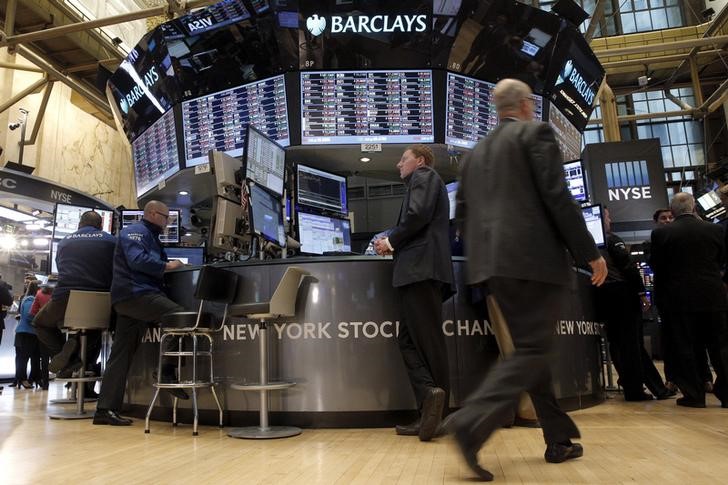By Geoffrey Smith
Investing.com -- Jerome Powell returns to Capitol Hill for more testimony a day after rattling global markets with warnings that the Federal Reserve may step up the pace of rate hikes again. The comments pushed the dollar to a three-week high, two-year note yields to a 16-year high, and inverted the U.S. yield curve to a degree not seen since 1981. The ADP jobs report and the Labor Department's monthly survey of job openings are both due. U.S.-China relations continue to deteriorate as House Speaker Kevin McCarthy prepares to meet Taiwanese leader Tsai-Ing Wen. The Senate introduced a bill on Tuesday that could see video app TikTok banned in the U.S. on security concerns. And oil prices stabilize after plunging on Tuesday - with U.S. inventory data due at 10:30 ET. Here's what you need to know in financial markets on Wednesday, 8th March.
1. Brace, brace…
The dollar hit a three-month high and yields on short-dated Treasury bonds rose to their highest since 2007 after Federal Reserve chair Jerome Powell opened the door to a 50 basis point hike in the fed funds rate at the central bank’s next meeting in two weeks’ time.
Powell continues his Congressional testimony in the House of Representatives at 10:00 AM ET (15:00 GMT) after telling the Senate Banking Committee that rates are likely to peak above the Fed’s last implicit forecast of 5.1%, while also warning that the Fed was willing to raise in larger increments again, after slowing the pace of monetary tightening after its last two meetings.
The benchmark 2-year note now yields 5.04%, more than a full percentage point above the 10-year note at 3.97%. That degree of inversion – widely seen as a herald of recession - was last seen in 1981, when a certain Paul Volcker was running the Fed.
2. Potential pitfalls from the labor market; Bank of Canada rate decision eyed
Ahead of Powell’s second day of testimony, U.S. economic data have the potential to either calm nerves or upset the applecart again.
ADP publishes its monthly hiring report at 08:15 ET, while the Labor Department publishes its Job Openings and Labor Turnover Survey for January at 10:00 ET. Given the Fed’s focus on the labor market, a big deviation from consensus could cause quite a stir.
Also due are weekly mortgage applications numbers, which will cast fresh light on how bad the recession in the U.S. housing market is getting. Applications have fallen for four of the last five weeks and now stand at their lowest in 28 years.
Outside the U.S., the Bank of Canada will be hoping it’s second-guessed Powell correctly when it announces its interest rate decision at the same time as the Fed chief starts speaking. The BoC conspicuously paused its tightening cycle last month, leaving its key rate at 4.5%.
3. Stocks seen under pressure at opening
U.S. stock markets are set to stay under pressure at the open, posting only a modest bounce after heavy losses in response to Powell’s testimony on Tuesday.
By 06:30 ET, Dow Jones futures were up 45 points, or 0.1%, while S&P 500 futures were up 0.2% and Nasdaq 100 futures were up 0.3%. The S&P 500 cash index had fallen back below 4,000 on the news, while the Dow had fallen 1.7%.
Stocks likely to be in focus later include Crowdstrike (NASDAQ:CRWD), which beat expectations with its quarterly update late on Tuesday, and Stitch Fix (NASDAQ:SFIX), which posted a wider-than-expected loss. The stocks are going in opposite directions in premarket, accordingly.
Also in focus are Adidas (OTC:ADDYY), which slashed its dividend as it ponders what to do with over $1 billion unsellable Yeezy inventory, and Rivian (NASDAQ:RIVN), which hit a new all-time low on Tuesday after rival BYD (OTC:BYDDY) announced a big expansion into commercial vans.
4. U.S.-China ties fray as Senate introduces TikTok killer
Relations between the U.S. and China continue to deteriorate. The Senate introduced a new bill on Monday that would give the administration the power to ban apps that it considers a security threat.
That designation would most likely affect the short-form video app TikTok, whose storage of its user data in China exposes it to undue influence from Beijing.
Senator John Thune (R., SD) said the bill could lead to the app being banned in the U.S., something that would remove a key source of competition to the likes of Facebook (NASDAQ:META) owner Meta and Snapchat owner Snap (NYSE:SNAP).
The European Union separately banned the use of TikTok on official devices earlier this month.
5. Oil inventory drop corroborates Powell's warning on economic resilience
Crude oil prices are stabilizing after taking a battering from Powell’s comments on Tuesday, which boded ill for U.S. and global consumption for the rest of the year.
Powell overshadowed a surprising and large drop in U.S. crude inventories of over 3 million barrels last week, as estimated by the American Petroleum Institute. The numbers were a rare flash of resilience in U.S. demand after a string of inventory builds. The government releases its official data for last week at 10:30 ET.
By 06:45 ET, U.S. crude futures were down 0.1% at $77.48, having lost over $3 a barrel on Tuesday. Brent was up less than 0.1% at $83.33 a barrel.
